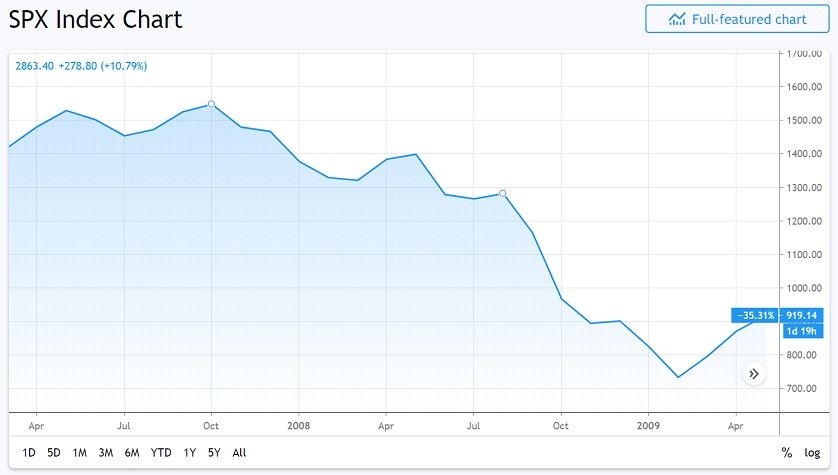“What’s the best investment strategy during a recession?”
“Should I start investing in an economic downturn?”
“When is it necessary to cut losses?”
“What are simple and safe financial instruments to invest in as a novice?”
Those are some questions I’ve been getting recently about investing. My quick answer would be:
Build up your emergency savings, then continue investing normally for the long term.
“Really? That sounds a bit too simple for a crisis like this. Are you sure?”
Yup. But of course, the devil is in the details. This is how I’m thinking around investing in these coronavirus times, and how an average investor should probably think about it too.
Investing Is (Probably) Not Gonna Replace Your Salary
I’m starting with this because I worry many people are looking at investing wrongly — like the magic bullet which will solve all their money problems.
I’ll be blunt: if you’re looking to make more money now, I don’t think you should be focused on investing.
Instead, get really good at your work. Build expert skills that are valuable to lots of people and charge for it. I say this in the broadest sense possible: this could be your day job or your side gig. It could even be your “passion project” online business which really takes off and becomes your main income.
Investing, on the other hand — is a long-term project that prepares you for your retirement 30 years away. It’s more about “protecting and growing” wealth you already have versus generating lots of new income.
It might take decades before your monthly investment returns even come close to your first salary (and most people never even get there). So unless you have a very special set of skills, you’re likely never gonna make a full-time income from investing.
Now that we’ve got those Wolf of Wall Street fantasies out of our heads, let’s talk about what’s coming next.
There’s Another Crash Coming
In March 2020, global markets (including stocks, bonds, oil, Bitcoin, and anything else people invest in) crashed like never before. Since then, most markets have partially recovered.
Which is REALLY weird, because broad consensus is economies around the world are pretty fucked up right now. A simple example: The S&P 500 (which represents the USA stock market) went up 28.48% percent in the same 4 weeks (23 March – 18 April) that >21 million Americans lost their jobs.
Which reminds me of a saying in finance circles: “The stock market is not the economy.”
When I say another crash is coming, I mean people feeling it. I mean people filled with fear, struggling to pay bills, and not having enough food. And if unemployment continues to grow around the world because of the coronavirus, eventually the markets will follow too.

In fact, many experts are saying we’re already in a recession — and the only question is whether we end up in a depression or not. A recession is like you having to skip dinner for a year. A depression is going to bed hungry for ten.
Looking at history, we can estimate that recovery might take years, or even decades (like the 1930s Great Depression). How should we invest our money?
The Pre-requisite: Survival
Survival is your utmost priority. It doesn’t matter how much your stock portfolio grows in the next five years, if you or your loved ones aren’t around to enjoy it.
So apart from health, your first priority is to ensure you have enough emergency cash. Your target: 6-12 months of expenses. This is money you can easily get if shit hits the fan.
What happens if your employer surprises you with a 20% pay cut, followed by your wife losing her job? Will you be able to survive such shocks? Even if everything’s fine with you, you’ll probably need cash to help your friends and relatives who are struggling.
So focus on this important point first, before you even think of investing.
Wait Till It Crashes, Then Buy Low Right? (No)
Moving on: Every investor has heard the saying “don’t try to time the market,” but it’s almost impossible to follow. “Why should I buy when the market is falling?” we question. “I’ll buy when it hits the bottom.”
Ah, the elusive bottom. Something people search their entire lives for, but nobody ever finds. But what if you somehow managed to do it? What if you had God-like market timing and somehow figured out exactly when to buy in? Someone has actually done the math.
Here’s Nick Maggiulli in his wonderfully-titled “Even God Couldn’t Beat Dollar Cost Averaging” article:
…Buy the Dip, even with perfect information, typically underperforms Dollar Cost Averaging (for the S&P 500). So if you attempt to build up cash and buy at the next bottom, you’ll likely be worse off than if you had bought every month.
Why? Because while you wait for the next dip, the market is likely to keep rising and leave you behind.
I know, it’s hard. We like to time the market because we wanna feel smart; like we’re getting a Mega Sale discount. But historically for most investors, it just doesn’t work.
Much better to find something you’re confident to invest in for the long term, then Dollar Cost Average in.
Time in the market beats timing the market.
Invest in the Broad Markets
Most people shouldn’t be choosing individual stocks to trade. Most people should be buying passive index funds or Exchange Traded Funds (ETFs).
What’s the easiest way to start? If you’re reading this from Malaysia, a robo-advisor is the fastest, cheapest, most convenient way to get a mix of high-quality ETFs.
Again, I’m writing this for the average investor. Someone who’s busy with his job and family, and doesn’t have Warren Buffett-like time to read financial papers. Maybe you think you’re not average (research says most of us think so too!), but history conclusively tells us even most professional money managers underperform. What are the odds Joe quietly scrolling Bloomberg.com at the corner over there can pick stocks better than professionals?
When you invest into a broadly-diversified instrument like an ETF, you’re not putting your hopes into a single company or management team. You’re investing into the collective capabilities of the most brilliant business minds in the world.
Yes, things may still go up and down. You may still get alarmed if your assets drop below your buying price. But over long periods of time, the human race has always continued to prosper and grow richer.
Have faith.
Invest for the Long Term
How long? Most industry professionals say you need at least 3-5 years of time when investing.
But I like to think further than that. If this is really the mother of all depressions like the 1930s, it might take decades to recover. I suggest you get comfortable investing for your retirement, not to aim to cash out in 5 years.
What if you need the money sooner? Say, you’re keeping money for your upcoming wedding in 3 years, or you’re really planning to retire in 10.
Park it in lower-risk funds instead. You’ll likely earn less, but the value should hold steadier. Again, it’s super easy to do this via robo-advisors. Just select a lower-risk portfolio and let the investing magic happen.
(Interested in more “what assets should I buy?” discussions? Check out my detailed article about risk, reward, and how exactly I built my own investment portfolio here.)

Be Careful With Debt (Only Invest Money You Don’t Need)
Another question I’ve been getting a lot is: “Now that interest rates are so low, should I borrow to invest?”
Generally speaking, no. You should never borrow to invest. Because interest rates — whether it’s for loans or investments — rise or fall together. So you’re not gonna find a situation where your risk-free return in an investment is higher than your interest rate for a loan.
(The only exception might be Amanah Saham Bumiputra (ASB) and ASB Financing, so please consider that if you’re bumi.)
“But P2P lending can give me 14%, while a banker offered me a personal loan at 4.5%! Surely that makes sense?”
It doesn’t. First, advertised interest rates are always much lower than effective interest rates (e.g. the real rate you pay for a 4.5% personal loan is >8%.) Secondly, returns on high-risk investments are not guaranteed (and most will crash in tough times), but you definitely still need to pay your loans.
So don’t “invest” with money you don’t have. That’s gambling.
In fact, I’d go so far as to say: Only invest with money you don’t need.
If you’re worried about making losses, then should you even be investing? As we first discussed, your first priority is survival — so any “worry money” actually belongs in savings or capital-guaranteed investments.
Investing When You’re Scared — Master Your Emotions
We’ve discussed a lot of technical things. But managing your emotions might be the most important point of all. Especially now.
It’s okay to feel fear; it’s okay to feel pain. There’s absolutely nothing wrong with retreating so you can fight another day. And a good rule for life is to acknowledge your feelings, instead of hiding from them.
But I know some of you reading this are in good financial positions. You’ve budgeted, saved and invested wisely so far. You’ve got those all-important emergency savings; and discipline.
To you I say: This is your time. This is your time to move boldly while others shrink in fear. You’ve prepared for this, so keep investing. There will still be ups and downs, and you’ll have to deal with huge uncertainty. But find courage and stay true to the path — and the gains when things rebound one day will be deservedly yours.
Fortunes were made by the brave in the previous financial crisis. I hope you’ll grow yours tremendously in the next one.
“A gem cannot be polished without friction, nor a man perfected without trials.”
– Seneca –
– – –
There’s two sides of extremism I often see: one is doing nothing when something goes wrong. The other is doing too much when all you need is patience. Wisdom is knowing where to stand on the spectrum.
Although I can’t prescribe you a step-by-step plan for your situation, I hope this article has given you useful perspectives about investing in difficult times.
Because while we can’t control the winds of the economy and the tides of the markets, we can take certainty in the only thing we actually control: our own actions.
So prioritize survival. Have faith and patience. Then boldly invest for the future.
I’ll see you on the other side.
– – –
Pics from Pexels: Quintin Gellar & Matej




Hi Aaron,
Is it safe to invest in Private Equity?
Every investment comes with risk/rewards. If you’re new to investing, I suspect that private equity might be too high a risk for you.
Hi, what do you think about ASBF ? Should I continue with it or just stop because of our situation right now (MCO). If I continue it will be at loss or it should be okay ? Last year dividend are very low, and im expecting the same for next year dividend.
It’s a bit hard for me to give suggestions based on the short message. I imagine you must be expecting the dividends to cover the interest (known as “rolling”)? From what I’ve heard this is risky. But again, I really don’t know too deeply into ASBF. Perhaps check out my friend’s writings and see if it helps here? https://faizwahab.com/asb-vs-asbf/?no_cache=1
Hi. I’m a Malaysian, and I was wondering if the recession means that I should avoid putting money into ASNB? Will the value ever drop to the point where I lose money that I use to buy ASNB? Or will it always be better than just keeping money in my savings account?
Thanks.
Which Amanah Saham are you specifically talking about? There’s two types — capital guaranteed and non-capital guaranteed.
With the capital guaranteed ones, you’ll never lose money, just whether your dividends are higher or lower. Examples of these would be Amanah Saham Wawasan 2020 and Amanah Saham 1 Malaysia.
When you say capital guaranteed and non-capital guaranteed, is that the same as fixed price vs variable price? I have a little invested in both (Amanah Saham Malaysia and SARA 1)… So SARA 1 might take a hit but ASM will be ‘risk-free’ even if returns will likely be low for a while?
Thanks for your helpful info.
Yup, fixed price for all intents and purposes means capital-guaranteed. You’ll never lose; just whether your dividends are good or not.
Hi, I m from Singapore and is new to investing. Any recommended client/platform with the lowest commission? It was a nice read anyway!
Hi, and thanks for dropping by!
With Singapore you have a lot more options than in Malaysia. Try checking out some of the blogs below:
https://www.turtleinvestor.net/
https://www.sgbudgetbabe.com/
Very timely advise when i was just looking in to these. Good reminder to still be cautious and not get carried away with what i think as “investing”
Thank you Xiu Miin!
Hope you’re well and please take care. Manage your risk accordingly ok?!
So having plan to opt for retirement end of this year would not be a wise idea right Aaron?
Mmmmm,
If your finances are REALLY solid and in order why not? (Question is at what level do you feel comfortable with enough…)